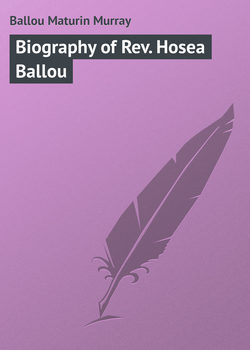Biography of Rev. Hosea Ballou

Реклама. ООО «ЛитРес», ИНН: 7719571260.
Оглавление
Ballou Maturin Murray. Biography of Rev. Hosea Ballou
AUTHOR'S PREFACE
CHAPTER I. INTRODUCTORY
CHAPTER II. BIRTH AND PARENTAGE
CHAPTER III. EARLY LIFE
CHAPTER IV. BECOMES A PROFESSOR OF RELIGION
CHAPTER V. COMMENCES TO PREACH
CHAPTER VI. BECOMES A SETTLED MINISTER
CHAPTER VII. REMOVES TO PORTSMOUTH, N. H
CHAPTER VIII. SETTLES IN BOSTON
CHAPTER IX. COMMENCES THE UNIVERSALIST MAGAZINE
CHAPTER X. COMMENCES THE UNIVERSALIST EXPOSITOR
CHAPTER XI. DOMESTIC AND PERSONAL CHARACTERISTICS
CHAPTER XII. MR. BALLOU AS A CONTROVERSIALIST
CHAPTER XIII. SPIRIT OF HIS DOCTRINE
CHAPTER XIV. SENTIMENTS RELATIVE TO DEATH
CHAPTER XV. END OF HIS EARTHLY MISSION
CHAPTER XVI. CONCLUSION
Отрывок из книги
The gratitude of mankind has not failed to record with honor the names of those who have been the inventors of useful improvements in the arts, or the authors of scientific discoveries, of brave warriors and wise statesmen; ancient history reveals to us the time when the inventors of letters and the plough, were revered as divinities. If there are any who are actually worthy of being remembered by the world, they are those who have proved themselves, by the lives they have led, and by their holy teachings, to be benefactors of the human family, and true followers of Christ.
It is conceded by all, that biography is a most important species of history. Through its agency, men who have been distinguished for merit, talent, or any peculiar virtue, are remembered, and, though they may be personally lost to us, yet the good influence they exerted during their lives, is made to continue for our benefit. The biography of any eminent individual must be, in some degree, a chronicle of the times in which he lived, and thus, though the production may be of the most humble character, the pages of history are enriched, and the records of the past perfected. We think it was the Rev. John Ewart, M. A., a noted English divine, who set it down as one of the most interesting reflections relative to biographical reading, that we may see and know in heaven, those whose life and excellent works we have read of here. This is, perhaps, rather a peculiar argument, but not inappropriate in this connection.
.....
Mr. Ballou undoubtedly owed the vigorous health which carried him through the exertions of a life protracted beyond the allotted span, to the athletic training of his youth, in his labors and in his sports. One of the besetting sins of the present mode of education is the almost total neglect of physical training, and the forcing system applied to the mind at the expense of the body. We hear much about sanitary reform and the necessity of exercise; we write and read voluminous treatises on the best mode of preserving bodily health, and almost all of us can talk learnedly upon the subject, and yet in practice we set at naught all our elaborate theories. How rare it is to see a vigorous, ruddy-cheeked student. The ancients were wiser than ourselves in this respect, for with them mental and physical training went hand in hand. A popular form of instruction was that given orally in the open air; and thus, during the very hours of study, the frame was submitted to the healthy influence of pure air. The subject of these memoirs often referred to the pale cheek, stooping form, and defective vision which are characteristics of the American student, and he never failed to inculcate on all proper occasions the preservation of health as a high moral duty.
While of tender age, and in each successive year, he evinced an ardent and constantly increasing desire for scriptural knowledge; and the earliest dawnings of his young mind among his brethren were of a character that gave promise of the Christian grace and excellence to which he attained in after years. It is interesting and curious to trace the unconscious, and, so to speak, the providential adaptation of the early life to the future calling of riper experience. Mr. Ballou says, in relation to this subject: – "I was remarkably inquisitive, even when a mere boy, about doctrines. I was fond of reasoning on doctrinal points, studied and talked much upon the subject of free will and necessity. I well remember to have surprised my honored father with such a question as the following: 'Suppose I had the skill and power out of an inanimate substance to make an animate, and should make one, at the same time knowing that this creature of mine would suffer everlasting misery, – would my act of creating this creature be an act of goodness?' The question troubled my father, and I let it pass without an answer."
.....